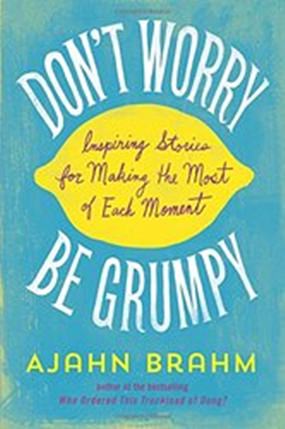The author of the book reviewed this week is a Buddhist monk, Ajahn Brahmavamso Mahathera (known to most as Ajahn Brahm). He was born Peter Betts in London, United Kingdom in August 7, 1951, and came from a working-class background, but won a scholarship to study Theoretical Physics at Cambridge University in the late 1960s. At Cambridge he joined the university’s Buddhist Society and after a few weeks at the age of 18, he saw a monk for the first time. He knew then that was what he wanted to be. After graduating from Cambridge he taught in a school for one year before travelling to Thailand to become a monk and train with the Venerable Ajahn Chah Bodhinyana Mahathera.
Whilst still in his years as a junior monk, he was asked to undertake the compilation of an English-language guide to the Buddhist monastic code – the Vinaya – which later became the basis for monastic discipline in many Theravadan monasteries in Western countries.

It does seem to go together well – a Buddhist monk and a self-help treatise. After all, Buddhism promotes the concept of personal enlightenment through meditation.
This new book (ISBN 978-1-61429-167-1, Wisdom Publications, 2014) adds to his three other books, and again he suggests ways that the ordinary man or woman can separate the mind from the difficulties surrounding it.
“Don’t Worry – Be Grumpy” is perhaps a (sub) conscious play by Ajahn Brahm on the pop song “Don’t worry – Be Happy”, a song by musician Bobby McFerrin. Released in September 1988, it became the first a cappella song to reach number one on the Billboard Hot 100 chart, a position it held for two weeks. The song’s title is taken from a famous quotation by the mystic Meher Baba.
Ajahn Brahm calls the contents of his book, “Inspiring stories for making the most of each moment.” This promise comes in the 108 brief stories with titles like “The Bad Elephant,” “Girlfriend Power,” and “The Happiness License”. Ajahn Brahm offers up more timeless wisdom that will speak to people from all walks of life. Drawing from his own experiences, stories shared by his students, and old chestnuts that he delivers with a fresh twist, Ajahn Brahm shows he knows his way around the humorous parable, delighting even as he surprises us with unexpected depth and inspiration.
For someone who is having problems with the everyday mental clutter that one engenders, this book may help you get the mind’s house in order with a few humorous chapters.
One of the short chapters deals with negative thoughts and memories, and Ajahn Brahm exhorts the reader to banish those thoughts, and replace with happy ones instead. Whilst the principle reads well, it is not quite as simple as he suggests, I fear.
One chapter deals with low self-esteem and Ajahn Brahm shows a very concrete way of attacking the problem, complete with reinforcement to “save you spending a lot of money on therapy!”
Expensive at B. 633 on the Bookazine shelves, but for those looking for this kind of publication and its uplifting messages, it is probably cheap therapy.




